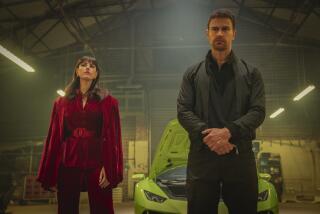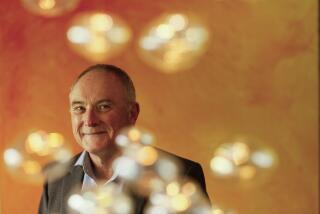Shia LaBeouf and Robert Redford are in good ‘Company’
NEW YORK — For all its perks, being a popular young actor like Shia LaBeouf in today’s media climate can come with some intense pressures.
So intense that one of Hollywood’s longest lasting stars says he probably couldn’t handle them.
“I don’t envy Shia’s generation,” said Robert Redford, LaBeouf’s director and co-star in the new dramatic thriller “The Company You Keep.” “If what’s put to him had been put to me when I was starting out, I might have stayed a painter.”
VIDEO: Robert Redford on “The Company You Keep”
LaBeouf, who joined Redford for an interview here this week, brought in a historical perspective. “There’s a lot less protection on a film set than there was in the ‘70’s. The stuff at my bake sale is some wild stuff. And to have art you need to feel protected.”
This now-and-then theme has been on both men’s minds lately. It dominates their new Sony Pictures Classics film, which opens Friday.
“Company” is a moral mystery as much as a literal one. It follows Redford’s Nick, a 1960s radical who appears to have been guilty of murder in an act of political protest gone wrong. Living undercover as a suburban husband and father for decades, Redford’s character is forced to go on the run after a journalist (LaBeouf) discovers and then pursues him. Nick is soon seeking out fellow former radicals to help him clear his name.
As it tracks the two men’s movements, the movie elucidates secrets about Nick’s past as well as explores questions about the justification for violence, the limits of idealism and how an older generation’s politics can seem alien to a younger one.
“I’m attracted to something that’s not really displayed in American life — the gray area,” said Redford, not shy, particularly in this phase of his career, about inserting politics into his work. “There was a time when that was what our movies did. But that’s being squeezed out of both our movies and our lives.”
LaBeouf said he saw this film’s excursion into radicalism and its ethics as a kind of personal wish-fulfillment. “My friends and I don’t have the same fears my dad’s generation did,” he said of his father, a Vietnam veteran and outspoken progressive. “He and Bob were in the midst of some pretty wild stuff. My generation’s wildest stuff politically is Occupy Wall Street.”
The movie was not an easy one to finance, falling apart several times in four years of development before coming together as a low-budget independent production in Vancouver last year. The script by Lem Dobbs (“The Limey”) is based on a novel by Neil Gordon.
“Look, this was a [bad] situation,” Redford said, using much stronger language. “The financier was putting on so many restrictions, and he wasn’t saying yes, so we couldn’t go. And if we did go, the budget was so low it was unworkable. Plus, actors these days are doing three projects at once, so you don’t have a lot of time to all be there together.”
He added. “But that’s not exclusive to this film. All these films were easier to make in the 1970s.”
Despite the difficulties, Redford continues to make movies, often on subjects that don’t square with the interests of today’s multiplex-going audience (though he is taking a little detour into popcorn-land with an acting turn in the new “Captain America”). The last film he directed, 2011’s “The Conspirator,” a period courtroom drama about accused John Wilkes Booth collaborator Mary Surratt, earned strong reviews but fizzled at the box office after receiving little distribution support.
PHOTOS: Hollywood backlot moments
If some hear in Redford’s comments the pinings of a man for a time long gone, LaBeouf says the belief in that era is what made today’s quality work possible. “Bob’s generation built what allows my generation to dream,” he said.
Making the movie allowed for its own sort of generational bridge.
Though separated by half a century and an ocean of differences, Redford (76) and LaBeouf (26) are cut from similar cloth, equally serious both in their belief in movies as an agent of change and in their own demeanors. When LaBeouf stepped into the interview a minute late, he walked up to Redford, shook his hand and said sincerely, “I’m sorry.” Redford replied, also unblinking: “You don’t have to ever apologize to me for being late, Shia.” Later, LaBeouf said he enjoyed working with Redford because “the man shared love with me. It’s not like he just shared a story. He shared love.”
The two came together because of mutual professional interest. Redford said he liked that Shia was a quick study and that he would require little explicit guidance, key for a movie with a quick schedule and a large cast. (To prepare, the actor followed Los Angeles Times reporter Robert Faturechi and read J-school staples such as Janet Malcolm’s “The Journalist and the Murderer.”)
With a number of hits (and tabloid headlines) under his belt, LaBeouf has consciously branched out in new directions — he also stars in recent violent independent dramas including John Hillcoat’s “Lawless” and Fredrik Bond’s “The Necessary Death of Charlie Countryman” and is next up in a Lars von Trier graphic two-part film, “Nymphomaniac.” He also says he is in the early stages of planning a movie with his “Wall Street: Money Never Sleeps” director, Oliver Stone.
If intensity is a professional hallmark of the actor, it can also characterize his behind-the-scenes behavior, the most recent of which was a messy disagreement with co-star Alec Baldwin during rehearsals for their Broadway show “Orphans.”
LaBeouf views this as an occupational hazard. “A set is emotional, like any place of high productivity,” he said. “You get me and Stanley Tucci in a room and it’s not going to be very copacetic,” he added, referring to his fellow “Company” actor. “There’s going to be a little bit of a rub.”
Shortly after LaBeouf left “Orphans,” the tension with Baldwin spilled into public view and then onto Twitter. Though LaBeouf had his say, he felt there was something dangerous about the constant coverage.
“I think it’s a doubled-edged sword,” said the actor, who sometimes seems to be fighting a battle with himself over his natural inclination toward candor. “It has a way of cheapening the mystery. And something like Twitter does have a way of clearing the air. But it also has a way of killing your interests.
“Look, generally there’s more information. You get the truth from 40 sources, but where do you find the actual truth?”
Redford nodded in agreement and said he had his own response to fame decades ago.
“I can’t advise Shia on how to be in the business. I can only tell him what it was for me,” he said. “I learned early on that there’s a lot of hype in Hollywood and that some of that hype is toxic. I survived by moving away from it, by going to the mountains [of Utah, where he lives part-time.] By coming and going, by doing the work and leaving, by dropping bombs in enemy territory and getting out. Success has a very dark side. You want to shadowbox with success. You don’t want to embrace it.”
More to Read
Only good movies
Get the Indie Focus newsletter, Mark Olsen's weekly guide to the world of cinema.
You may occasionally receive promotional content from the Los Angeles Times.







